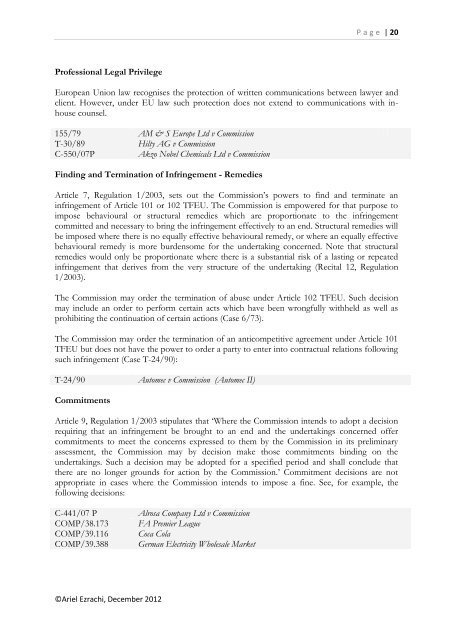EU Competition Law and Policy - compal
EU Competition Law and Policy - compal
EU Competition Law and Policy - compal
You also want an ePaper? Increase the reach of your titles
YUMPU automatically turns print PDFs into web optimized ePapers that Google loves.
Professional Legal Privilege<br />
©Ariel Ezrachi, December 2012<br />
P a g e | 20<br />
European Union law recognises the protection of written communications between lawyer <strong>and</strong><br />
client. However, under <strong>EU</strong> law such protection does not extend to communications with inhouse<br />
counsel.<br />
155/79 AM & S Europe Ltd v Commission<br />
T-30/89 Hilty AG v Commission<br />
C-550/07P Akzo Nobel Chemicals Ltd v Commission<br />
Finding <strong>and</strong> Termination of Infringement - Remedies<br />
Article 7, Regulation 1/2003, sets out the Commission’s powers to find <strong>and</strong> terminate an<br />
infringement of Article 101 or 102 TF<strong>EU</strong>. The Commission is empowered for that purpose to<br />
impose behavioural or structural remedies which are proportionate to the infringement<br />
committed <strong>and</strong> necessary to bring the infringement effectively to an end. Structural remedies will<br />
be imposed where there is no equally effective behavioural remedy, or where an equally effective<br />
behavioural remedy is more burdensome for the undertaking concerned. Note that structural<br />
remedies would only be proportionate where there is a substantial risk of a lasting or repeated<br />
infringement that derives from the very structure of the undertaking (Recital 12, Regulation<br />
1/2003).<br />
The Commission may order the termination of abuse under Article 102 TF<strong>EU</strong>. Such decision<br />
may include an order to perform certain acts which have been wrongfully withheld as well as<br />
prohibiting the continuation of certain actions (Case 6/73).<br />
The Commission may order the termination of an anticompetitive agreement under Article 101<br />
TF<strong>EU</strong> but does not have the power to order a party to enter into contractual relations following<br />
such infringement (Case T-24/90):<br />
T-24/90 Automec v Commission (Automec II)<br />
Commitments<br />
Article 9, Regulation 1/2003 stipulates that ‘Where the Commission intends to adopt a decision<br />
requiring that an infringement be brought to an end <strong>and</strong> the undertakings concerned offer<br />
commitments to meet the concerns expressed to them by the Commission in its preliminary<br />
assessment, the Commission may by decision make those commitments binding on the<br />
undertakings. Such a decision may be adopted for a specified period <strong>and</strong> shall conclude that<br />
there are no longer grounds for action by the Commission.’ Commitment decisions are not<br />
appropriate in cases where the Commission intends to impose a fine. See, for example, the<br />
following decisions:<br />
C-441/07 P Alrosa Company Ltd v Commission<br />
COMP/38.173 FA Premier League<br />
COMP/39.116 Coca Cola<br />
COMP/39.388 German Electricity Wholesale Market



